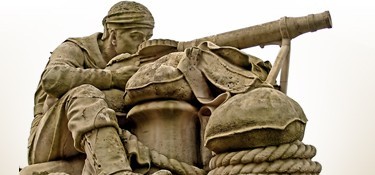
Website location: Home > Theology / Spirituality > Creation Theology > Theodicy: Evil if God Is Good?
|
THEODICY:
WHY IS THERE EVIL IF GOD IS GOOD?
How can evil exist in the world if God is good? Why is there good and evil in the creation? How could evil exist if the world was created by a good and all-powerful God? Two classical arguments have been used to answer this question.
Theodicy of Free Will
God created a world of unspoiled harmony, beauty, and order at the beginning of time. Evil is introduced by the free acts of the spiritual beings whom God created – and so evil is the disorder that consequently infects the entire universe. The bad angels and the first human couple misused the gift of freedom bestowed upon them by God.
The theodicy (or cosmology) of free will is usually traced back to the theology of Augustine of Hippo. However, the evolutionary theory has impacted this understanding. Nevertheless, the belief that evil has its source in man’s free deviation from God’s will (a deviation for which man alone is responsible) still influences many theologians.
Augustine does not offer a good reason why some angels cleaved to the good and others did not if all were initially created in the same state of perfection and happiness. Karl Rahner, a modern theologian influenced by Augustine, was also forced to abandon the theodicy of free will as an adequate response of Christian faith to the understanding of evil.
Theodicy of Development
God creates the world not all at once, but over a long period of time. His creative work will be complete only when time ends and an eternal state of intimate communion between men and God is permanently established. Evil is linked to the incomplete character of the created order as it evolves.
The way of justifying God’s goodness and power in the light of evil is to describe the positive role it can play in leading to salvation and how its sting is diminished by the nature of that end. God ordains evil as well as the good but never independently of the good – the evil serves the good. The logic behind such a paradoxical position is developmental – man must grow into God-consciousness. In sum, sin and evil are not only permitted but ordained by God – the consciousness of sin serves the development of the consciousness of God.
Two theologians who exemplify this thinking are Friedrich Schleiermacher and Teilhard de Chardin.
Criticism of the Two Classical Theodicies
Both the theodicy of free will and theodicy of development have logical difficulties and ambiguities – despite the profundity of their insights and their usefulness in understanding freedom, human initiative, and cosmic development. They seem only to move the problem back one step further or to obscure deeper issues at stake.
Source: Notes are based on Michael Galligan, God and Evil (New York: Paulist Press, 1976), 17-37.
Photo credit: Intellimon Ltd. |
Website location: Home > Theology / Spirituality > Creation Theology > Theodicy: Evil if God Is Good?
|
|
A practical spirituality |
|
OTHER SITES OF INTEREST
www.prayer-of-the-heart.org
Deals with the prayer of the heart, or meditation, and includes quotes from a variety of
spiritual writers.
www.truth-and-beauty.org
Seeks to capture what is true and beautiful. With the aim to help website visitors to
appreciate the nature of reality, the site deals with practical and spiritual aspects of life. It
also includes nature images as well as heart-warming stories.
www.heavens-reflections.org
Features the theme of seeing the extraordinary in the ordinary, the sacred in the daily, and
the special in the routine. Shows how the world around us, upon deeper looking, reflects spiritual
realities.
www.pathway-to-life.org
Presents the essential Christian message under 36 biblical topics in Q & A style.
Supporting scriptures are given throughout.
For viewing this website on a mobile, please go to:
Web design: Alexander Peck (using XSitePro2 site builder)
Photos: Alexander Peck (unless otherwise noted)
© 2012 and beyond - All Rights Reserved
Web hosting: VodaHost (unlimited websites at low cost)
Last updated: August 1, 2012


 Facebook
Facebook Twitter
Twitter